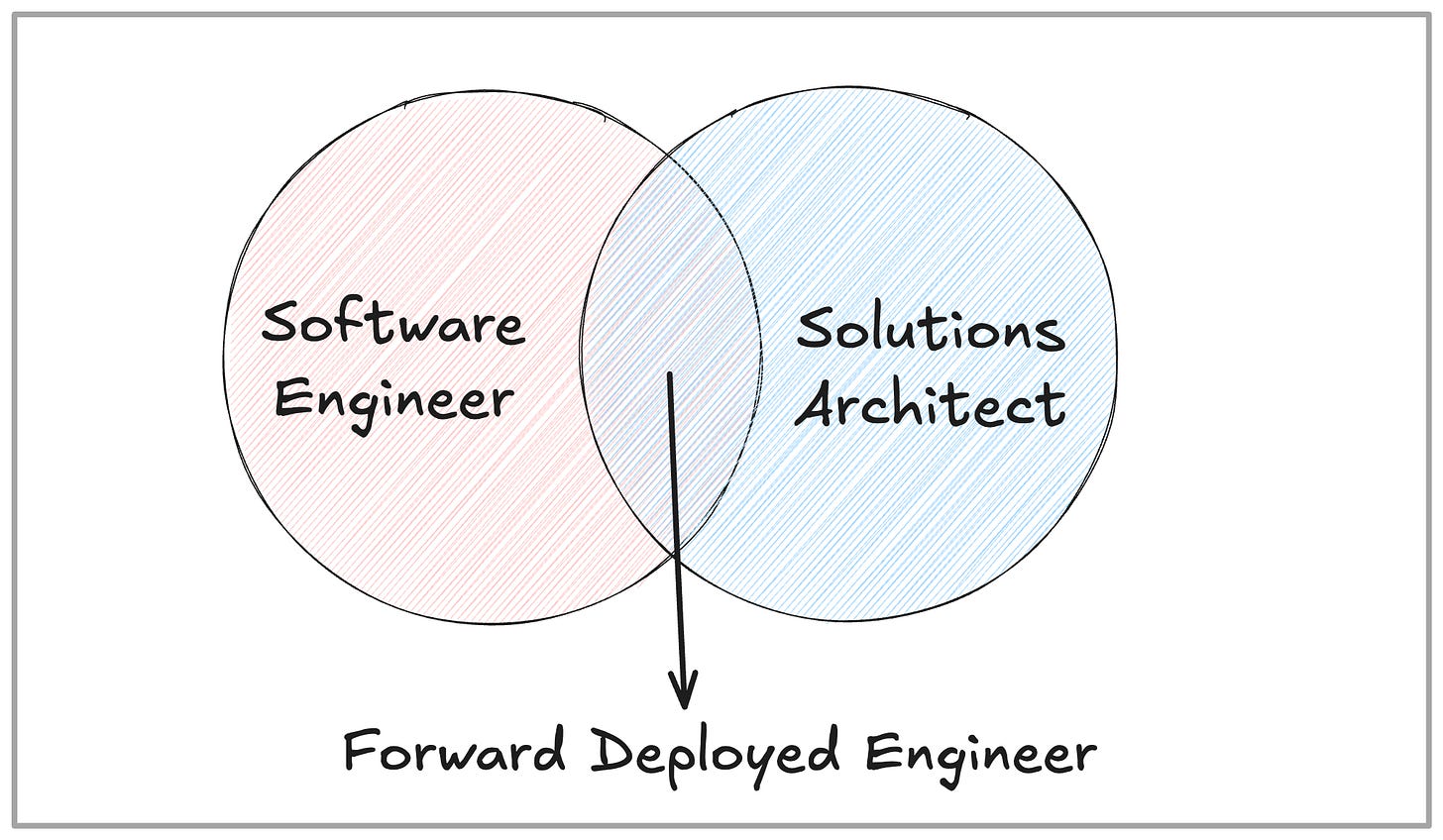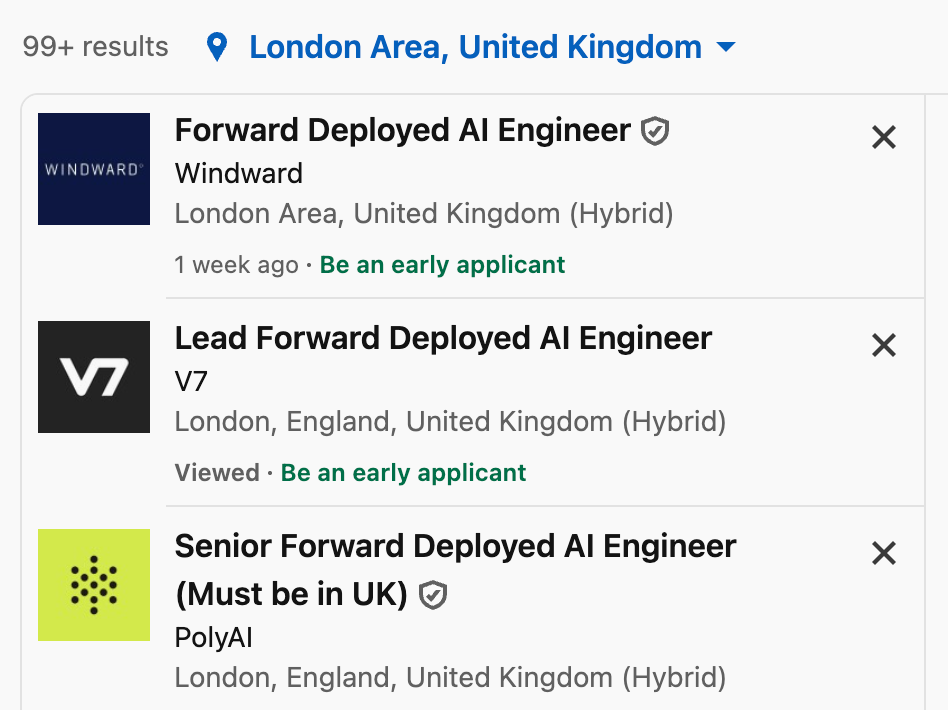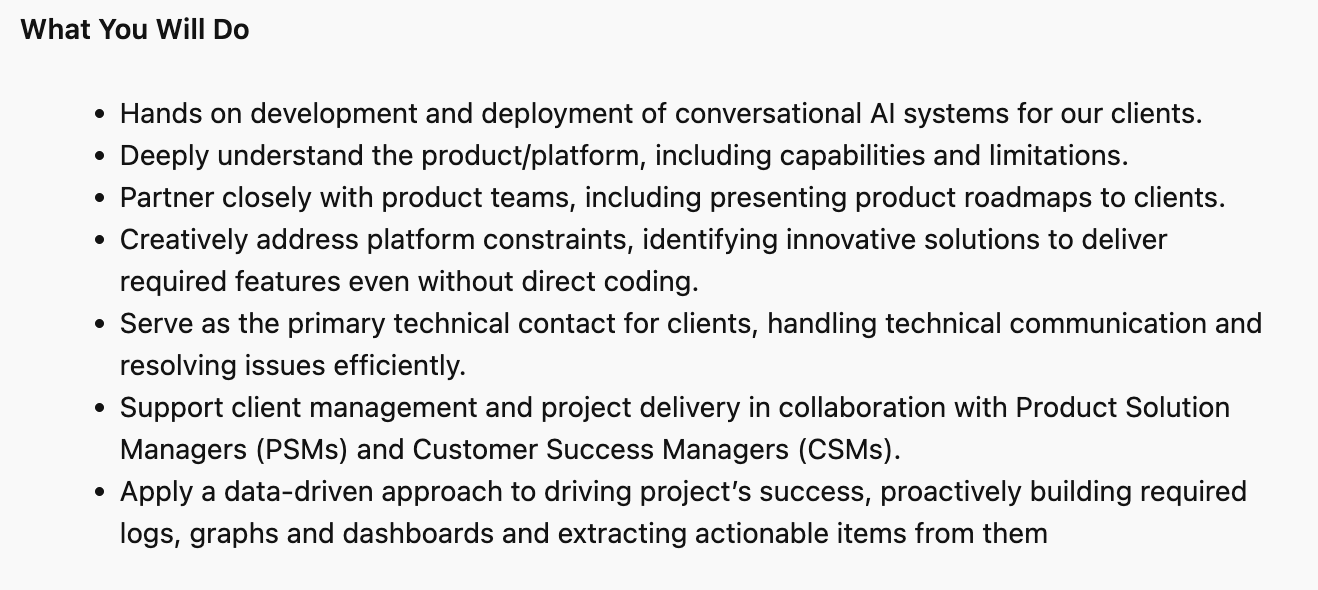The Role of Forward Deployed Engineers (FDE) in the AI Era
How FDE role overlaps with Solutions Architect role
Hey, Prasad here 👋 I'm the voice behind the weekly newsletter "Big Tech Careers."
In this week's article, I share why Forward Deployed Engineers (FDE) role is becoming popular with AI startups and how it’s related to role of Solutions Architect.
If you like the article, click the ❤️ icon. That helps me know you enjoy reading my content.
In this AI era, organizations face a critical challenge: how to effectively bridge the gap between cutting-edge AI capabilities and real-world business applications.
Traditionally, this bridging function was handled by solutions architects who worked in both pre-sales and post-sales capacities, helping customers understand product capabilities, designing implementation approaches, and ensuring successful deployment. However, the complexity and specificity of AI technologies have created demands that extend far beyond the traditional solutions architect model.
Enter the Forward Deployed Engineer (FDE), a role that has evolved from a specialized position at select technology companies into a crucial function for AI-driven organizations across all sectors.
While solutions architects focused primarily on system design and high-level implementation guidance, FDEs represent a more hands-on, embedded approach that addresses the unique challenges of AI deployment and adoption.
Understanding the Forward Deployed Engineer
Forward Deployed Engineers are technical professionals who work directly at client sites or within specific business units, serving as the crucial link between engineering teams and end-users.
Unlike traditional engineers who primarily work within the confines of their own organization's development environment, FDEs embed themselves in the operational context where technology meets real-world challenges.
Also, the FDE role represents a significant evolution from traditional customer-facing technical roles.
Pre-sales Solutions Architects focus on understanding customer requirements, demonstrating product capabilities, and designing high-level solutions to close deals. Their primary objective is to prove technical feasibility and business value during the sales process.
Post-sales Solutions Architects typically handle implementation planning, provide technical guidance during deployment, and ensure systems are configured correctly according to specifications. While valuable, these roles often operate at a higher level of abstraction and have limited ongoing engagement once initial implementation is complete.
FDEs, in contrast, maintain a continuous, hands-on presence throughout the entire customer lifecycle. They don't just design solutions or oversee implementations—they actively participate in day-to-day operations, troubleshoot issues in real-time, and evolve systems based on actual usage patterns.
The Intersection of Engineering and Solutions Architecture
The Forward Deployed Engineer role represents a unique intersection between Software Engineers (SWE) and Solutions Architects (SA), combining the best aspects of both disciplines to address the complex demands of enterprise and defense software implementation.
Software Engineers
Traditionally focused on product development within their organization's engineering teams, with varying degrees of customer exposure depending on the company and product type. They build features, fix bugs, and optimize performance, but their work is often abstracted from the end-user experience through layers of product management, customer success, and support teams.
While some software engineers have substantial customer interaction, many operate primarily within internal development cycles.
Solutions Architects
Specialize in customer adoption and implementation guidance, understanding customer needs, designing solutions, and providing technical leadership during deployments.
Solutions Architects often provide valuable product feedback and influence roadmaps based on customer requirements, though they typically don't contribute code directly to core products.
Forward Deployed Engineers
Uniquely bridge the traditional divide by simultaneously building product capabilities while implementing solutions directly for customers. They possess the deep technical skills of software engineers—writing code, debugging complex systems, and architecting solutions—while maintaining the customer-centric perspective of solutions architects.
FDEs conduct deep technical integrations, perform custom development work, and serve as technical consultants who shape how products are used in complex customer environments.
FDEs work on-site with customers, understanding real-world usage patterns firsthand while contributing code and features back to the core product.
The Powerful Feedback Loop
This intersection creates a powerful feedback loop: FDEs implement solutions using existing product capabilities, identify limitations or opportunities during deployment, and then contribute code and features back to the core product to address these gaps. They serve as both the implementer and the product developer, ensuring that products evolve in direct response to real-world customer needs rather than theoretical requirements.
The Evolution of FDE in AI Context
The concept of forward deployment originated in companies like Palantir Technologies, where engineers would work directly with government agencies and large enterprises to implement complex data analytics solutions. As AI technologies have democratized and proliferated, this model has proven invaluable for AI adoption.
The AI Startup Revolution and FDE Adoption
The rise of AI startups and companies has dramatically accelerated the adoption of the FDE model.
A LinkedIn search for FDE roles shows 99+ results in the London area alone—most of them from AI startups.
Here are several compelling reasons why AI startups are adopting the FDE model:
Rapid Product-Market Fit Discovery: AI startups need to quickly validate whether their models and solutions work in real-world scenarios. FDEs enable direct customer engagement and rapid iteration cycles, allowing startups to pivot and refine their offerings based on immediate feedback from production environments. This is crucial in the AI space where theoretical performance often differs significantly from practical results.
Technical Complexity and Integration Challenges: AI products are inherently complex, involving machine learning models, data pipelines, infrastructure requirements, and integration with existing systems. Traditional sales and support models often lack the technical depth needed to successfully deploy these solutions. FDEs provide the hands-on expertise required to navigate these technical complexities while ensuring successful customer outcomes.
Competitive Differentiation: In a crowded AI market, successful implementation and customer success become key differentiators. Companies with strong FDE programs can guarantee not just product delivery but actual business value realization, creating significant competitive advantages. This is particularly important for AI startups competing against established technology giants.
Customer Education and Change Management: AI adoption often requires significant organizational change, from new workflows to different decision-making processes. FDEs serve as trusted advisors who can guide customers through these transformations, ensuring they maximize the value of their AI investments. This educational role is critical for customer retention and expansion.
Product Development Feedback: AI companies benefit enormously from understanding how their products perform in diverse real-world environments. FDEs provide invaluable insights that inform product roadmaps, feature prioritization, and model improvements. This feedback loop is essential for building AI products that truly solve customer problems rather than theoretical use cases.
Scalability Through Reusable Solutions: While FDEs work on custom implementations, they also identify patterns and common solutions that can be productized and scaled. This allows AI companies to build more robust, generalizable products while still providing personalized implementation support.
Modern AI FDEs combine deep technical expertise with business acumen, enabling them to understand both the technical possibilities of AI systems and the practical constraints of business operations. They serve as cultural and technical bridges, translating between the language of algorithms and the language of business outcomes.
Path to Becoming an AI Forward Deployed Engineer
Let's look at an example of an AI startup—PolyAI—that has FDE as an open role.
In the job description section, they provide details on the expectations for the candidate, which gives a fair idea of FDE roles and responsibilities.
If you are aspiring to enter this field, developing the right combination of technical and business skills is essential:
Technical Foundation
Build proficiency in machine learning fundamentals, data engineering, and software development. Focus on Python, SQL, and key AI frameworks like TensorFlow or PyTorch. Gain hands-on experience with cloud platforms (AWS, GCP, Azure) and understand deployment technologies including Docker and Kubernetes. Practice building end-to-end AI projects that demonstrate your ability to work across the entire ML lifecycle.
Business and Communication Skills
Develop deep understanding of at least one industry vertical—healthcare, finance, manufacturing, or retail. Learn to translate technical capabilities into business value and practice explaining complex AI concepts to non-technical stakeholders. Build experience in requirements gathering, stakeholder management, and change facilitation through customer-facing roles or internal projects.
Practical Experience
Seek opportunities in technical consulting, solutions engineering, or customer success roles that provide client interaction experience. Build a portfolio showcasing real-world AI implementations with clear business context and measurable outcomes. Contribute to open-source projects and participate in industry communities to demonstrate collaborative skills.
Entry Pathways
Target roles such as "Customer Engineer," "Solutions Engineer," or "Implementation Engineer" at AI startups, or "Technical Account Manager" positions at established tech companies. Consider consulting firms with AI practices or internal transitions within your current organization by volunteering for customer implementation projects.
Continuous Development
Stay current with AI developments through research publications, beta programs, and hands-on experimentation. Develop specialization in specific AI domains or industry verticals. Build professional networks through conferences, meetups, and online communities focused on AI implementation and customer success.
Common Pitfalls to Avoid
Over-focusing on technical skills without developing business acumen and communication abilities
Neglecting industry knowledge and trying to be a generalist across all sectors
Avoiding customer interaction during the learning phase—seek opportunities early
Underestimating soft skills like change management and stakeholder relations
Not building a portfolio that demonstrates real-world problem-solving capabilities
Conclusion
The role of Forward Deployed Engineers has become increasingly critical in the AI era, serving as essential bridges between advanced AI capabilities and practical business applications. As AI continues to transform industries and organizations, the demand for skilled professionals who can effectively implement, optimize, and maintain AI systems in real-world environments will only grow.
Success in this field requires a unique combination of technical expertise, business acumen, and interpersonal skills. Organizations that invest in building strong FDE capabilities will be better positioned to realize the full potential of their AI investments and maintain competitive advantages in an increasingly AI-driven world.
The future of AI deployment depends not just on the sophistication of the technology itself, but on the professionals who can effectively bridge the gap between possibility and practice. Forward Deployed Engineers represent the human element that makes AI transformation possible, ensuring that advanced technologies deliver tangible value in the complex, dynamic environments where business actually happens.






A lot more than expected... ! Thank you for sharing Prasad sir.
What an amazing article. Thank you for this! I am intrigued to know will the Giants adapt these roles in their systems as well or its hard to say so soon?